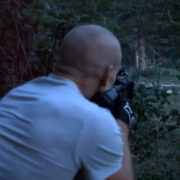TIFF 2025: The Smashing Machine

Wilson is a cinema enthusiast based out of Toronto, Canada.…
Dwayne Johnson finally takes another stab at serious acting, and although an Oscar nomination will likely be too much of a stretch, the former professional wrestling superstar dazzles in what is clearly his best performance to date. Benny Safdie’s first outing as a solo director is not your typical sports fighter biopic, and not surprisingly, also not your typical Safdie Brother’s film either. The Smashing Machine itself does follow some puzzling decisions, but is ultimately still an affecting drama that channels heartfelt empathy, with plenty of punches in between.
Following real life mixed martial arts (MMA) fighter Mark Kerr (Johnson) during his most prominent years in the industry, the film takes a deep dive into the inner demons he faced both in and outside of the ring. He’s supported, to some degree, by his girlfriend Dawn (Emily Blunt), and finds himself traveling between the US and Japan in order to build up his name as a champion. The film also features great performances from real MMA fighters Ryan Bader and Bas Rutten.
All about ‘The Rock’
To say that Johnson is transformative as Kerr is somewhat of a complicated statement. Physically, which is inherently the more obvious observation to be made, there’s certainly enough makeup and facial prosthetic work to argue that his presence is transformative to some degree. Yet, it’s also hard to argue that his own natural physique does a good amount of legwork here. Johnson’s emotional range, however, is certainly a welcome surprise and departure from what we have come to expect from him over the past decade.

One would have to go all the way back to Pain & Gain in 2013 to find a dramatically inclined and nuanced performance from Johnson. And before that, Be Cool (2005) and Southland Tales (2006) are perhaps the only other examples of films that weren’t fully commercial ventures. In those films, there were glimpses of what he was capable of doing, beyond touting his physical prowess as an action star. With The Smashing Machine, he’s able to flex both these muscles, crafting an emotionally complex character who appropriately leans on his physicality. It’s a thoughtful and restrained performance, and never feels over the top, even when it should. But to say that his performance is transformative is perhaps not fully warranted, as this seems like a natural and perfect fit for Johnson. It’s a role that almost seems tailor made for a man of his stature and background, hoping to realign his expectations as a serious actor.
Deliberate calm, but still thoroughly chaotic
The film itself is directed with just the right amount of grainy imperfections to feel like a refined version of its times. Safdie also creates enough room to breath, even in the midst of the narrative’s more intense moments, which is a departure from the usual suffocating intensity we’ve grown used to in a typical Safdie Brothers film. There’s still an ominous presence of potential dread, which is wrapped in a band of positivity, primarily thanks to Johnson’s unique performance. Blunt’s wild portrayal of a potentially toxic partner also creates some of the film’s more emotionally complex scenes.
Right at the outset, the film is setup in a way where chaos seems to be ever so present in the air. And there’s certainly enough chaos, in addition to both emotional and physical destruction to satisfy this expectation. Scenes concerning Kerr’s use of opioids, or the physical tole of fighting in a sport where rules centred around safety were still being developed, are as intense as one might expect. In between these scenes, however, Safdie humanizes Kerr’s imperfections, rather than exploit them for dramatic effect. It’s a fine balance that feels effortless at times, and doesn’t necessarily take away from the film’s strong characterizations.
At the end of the day, this is a showcase for Dwayne Johnson, and any concerns about his capabilities as an actor should hopefully be smashed following this performance. As a narrative centred around MMA, The Smashing Machine will likely not satisfy those hoping for a more traditional fighter biopic, but that was clearly never the intention here. Just as Kerr’s career – and all the other fighters highlighted in the film – never reached the pinnacle it deserved, the film’s climatic final fight is also somewhat anticlimactic. It’s a poetic and fitting way to close off a narrative that isn’t meant to invigorate, but rather, instill knowledge on a bygone era that never even fully arrived.
Does content like this matter to you?
Become a Member and support film journalism. Unlock access to all of Film Inquiry`s great articles. Join a community of like-minded readers who are passionate about cinema - get access to our private members Network, give back to independent filmmakers, and more.
Wilson is a cinema enthusiast based out of Toronto, Canada. He escapes from his day job by writing random thoughts about cinema on the internet. Although he has a longstanding penchant for Hong Kong cinema, he considers himself to be an advocate for Asian cinema in general. He has been attending the Toronto International Film Festival every year since 2005, and more of his work can be found on his website: www.wilson-kwong.com.













